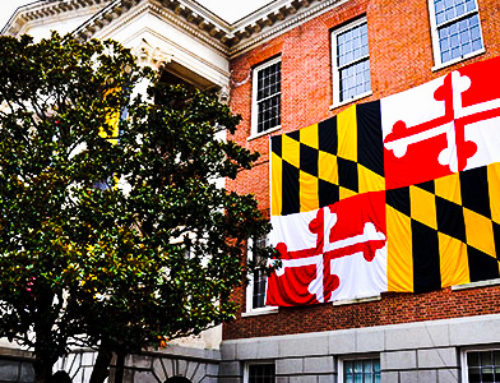View by Topic
Recent Articles
-
New Environmental Laws from the 2025 Maryland Legislative SessionSaturday, April 26th, 2025
-
Migratory Bird Treaty Act Does Not Prohibit Incidental Take – AgainSaturday, April 19th, 2025
-
President Trump’s Bold Step to Rein in State Overreach in Climate ChangeSaturday, April 12th, 2025
-
Mandatory GHG Disclosures in Maryland Real Estate ContractsSaturday, April 5th, 2025
View by Month/Year
“Green Building Law Update” Headlines
Recent Articles & News from
Stuart Kaplow’s blog
at GreenBuildingLawUpdate.com
- New Environmental Laws from the 2025 Maryland General Assembly Session April 27, 2025
- Migratory Bird Treaty Act Does Not Prohibit Incidental Take – Again April 20, 2025
- President Trump’s Bold Step to Rein in State Overreach in Climate Change April 13, 2025
- Mandatory GHG Disclosures in Maryland Real Estate Contracts April 6, 2025
Subscribe to the Green Building Law Update!
Stuart Kaplow brings his expertise and extensive experience to the table with his unique digital publication, "Green Building Law Update". Subscribers receive regular updates to keep them informed about important issues surrounding Environmental Law, Green Building & Real Estate Law, as well as the emerging demand for Environmental Social Governance (ESG).
Get fresh content through the lense of Stuart Kaplow's cutting-edge expertise, innovative commentary and insider perspective. Don't miss another issue! Subscribe below.
Vestiges of “Blue Laws” Prohibit Landlords from Requiring Merchants to Open on Sundays
Maryland’s “Day of Rest” law has received scant attention and many in the real estate community would be surprised that the law makes unenforceable “open for business” clauses typically found in shopping center leases such that a landlord can not require a merchant to open the merchant’s place of business on Sunday.
Consideration of this prohibition invites a local jurisdiction by local jurisdiction historical review.
Introduction
Virtually no “Blues Laws” – state or local – apply in Baltimore City today. In 1999, the last vestiges (save one) of the City’s local laws purporting to regulate Sunday business were repealed by Ordinance 99-526. Today, the only remaining local law of this sort applies to pawnbrokers. Specifically, Article 2, § 11-16(b)(2) of the City Code states: “No business shall be conducted on a Sunday by a pawnbroker in Baltimore City.”
At the State level as well, most of the centuries-old “Blue Laws” have been repealed, and the general rule today is, as stated in § 18-101(b) of the State Business Regulations Article: “Subject to this section and § 3-704 of the Labor and Employment Article, a retail or wholesale establishment may do business on Sunday.” (Exceptions in the section itself deal with, among other things, alcoholic beverage sales and motor vehicle sales.)
To be sure, some State laws still regulate one or another Sunday activity. A few of these regulated activities might be found in a shopping center. For example: Alcoholic Beverage Sales [Article 2B], Bingo [Art. 27, § 260], and Banking Institutions [FI § 5-704].
For the most part, however, the regulated activities are not of the sort that would affect shopping center operations. For example: Automobile Sales [BR § 18-101], Crabbing [NR §§ 4-701, 4-804], Dredging [NR § 4-1014 et seq.], Mile Thoroughbred Racing [BR § 11-504(b)], Patent Tonging [NR § 4-1021.1], Service of Certain Writs [CJ § 6-302], and Speed Limits on Severn [NR § 8-725.3].
There remains to be considered, however, the State’s “Day of Rest” law and, especially, its impact on “open for business” clauses typically found in shopping center leases.
Legislative History
In the late ’70s and early ’80s, the General Assembly began to chip away at the county-by-county hodge-podge of Sunday Closing Laws, a/k/a “Blue Laws”. One of the first of these reforms was Chapter 864, Laws of Maryland 1980, which revised the Sunday Closing Laws for Baltimore City and Anne Arundel, Baltimore, and Howard Counties.
Chapter 864 enacted a new section for Baltimore City and Baltimore County (Article 27, § 534L), which generally prohibited “wholesale or retail establishment[s]” from conducting business on Sundays. That section, however, was followed by another (Article 27, § 534L-1), which excepted a variety of enterprises from the general prohibition (e.g., service establishments, drug stores, restaurants, and food stores). Yet a third section (Article 27, § 534L-2) created an “Employees’ Day of Rest” option: every nonmanagerial and nonprofessional employee of a wholesale or retail establishment was given the statutory right to “choose Sunday or his Sabbath as a day of rest” and, once having done so, could not be compelled to work on that day of rest.
With respect to Baltimore City, Chapter 864 made two other fundamental changes. At the time, Article II (the so-called “Express Powers”) of the City Charter granted broad authority to the City to enact laws prohibiting or regulating Sunday activities. Chapter 864 amended Article II, § 37 to narrow that authority and to provide that, “except for [Article 27,] §§ 534L, 534L-1, and 534L-2” (the new sections being added for Baltimore City and Baltimore County), none of the State’s remaining Sunday Closing Laws applied in Baltimore City. Also, Chapter 864 provided (in an uncodified Section 7) that “the provisions of this Act are preemptive and repeal inconsistent provisions of any ordinance or resolution of Baltimore City which regulate wholesale and retail sales on Sunday”.
While Chapter 864 was pending before the General Assembly, the proposed “Day of Rest” provisions in § 534L-2 were amended to add one further protection against compelled Sunday labor. Specifically, a new subsection (d) was added to state: “In Baltimore County and Baltimore City, notwithstanding any agreement to the contrary, no person may be required to open his place of business on Sunday.”
The reform movement grew and, 7 years later, the General Assembly considered a bill to repeal the Sunday Closing Laws “statewide”. While the bill was pending before the General Assembly, 3 counties (Allegany, Washington, and Wicomico) opted out of the reform. In the end, enacted as Chapter 589, Laws of Maryland 1987, the bill somewhat less grandly repealed “the assortment of laws that govern the sale of goods, materials, and services on Sundays in Maryland, with an exception”. Among the many sections that Chapter 589 repealed were Article 27, §§ 534L, 534L-1, and 534L-2, then the only State “Blue Laws” applicable to Baltimore City.
Thus, on enactment of Chapter 589, Laws of Maryland 1987, “Blue Laws” were gone from Baltimore City and, indeed, most of the State.
The “Day of Rest” Rider
As introduced, Chapter 589 proposed a uniform, statewide “Day of Rest” section not unlike that previously contained in § 534L-2: a nonmanagerial and nonprofessional employee was given the opportunity to “choose as a day of rest his Sabbath or … Sunday” and, once having done, could not be compelled to work on that day of rest.
As had been the case 7 years earlier with the enactment of § 534L-2, this “Day of Rest” section also contained a “no-required-opening” provision. As originally proposed, the language was quite similar, albeit a bit more explicit, than that previously found in § 534L-2(d): “A retail or wholesale establishment may conduct business on Sunday for labor or profit in the usual manner and location, subject to the following: … (4) Notwithstanding any agreement to the contrary between a merchant and landlord, a merchant may not be required to open the merchant’s place of business on Sunday.”
Before enactment, that sentence was amended to insert the phrase “directly or indirectly” and to add a no-cancellation provision as well. Thus, as finally enacted, Article 27, § 493(b) stated, in relevant part:
“A retail or wholesale establishment may conduct business on Sunday for labor or profit in the usual manner and location, subject to the following: … (4) Notwithstanding any agreement to the contrary between a merchant and landlord, a merchant may not be required directly or indirectly to open the merchant’s place of business on Sunday.
(5) Notwithstanding any agreement to the contrary between a merchant and the landlord of the merchant, a landlord may not cancel or refuse to renew, directly or indirectly, the lease of a merchant because of the merchant’s refusal to open the merchant’s place of business on Sunday.”
Over the years, the basic “Day of Rest” provisions (those dealing with employees’ rights), have been revised and recodified as § 3-704 of the State Labor and Employment Article. And the “no-required-opening” law has been revised and recodified as § 18-101(c) of the State Business Regulations Article:
Notwithstanding an agreement to the contrary between a merchant and landlord:
(1) the landlord may not directly or indirectly require the merchant to open the merchant’s place of business on Sunday; and
(2) a landlord may not directly or indirectly cancel or refuse to renew the merchant’s lease because the merchant refuses to open the merchant’s place of business on Sunday.
Note that these recodified provisions are civil in nature, and no criminal penalty attaches.
Maryland’s “Day of Rest” law has received scant attention from legal authorities. In 70 Op. [Md.] Att’y Gen. 75 (1985), the Attorney General was asked to consider the constitutionality of granting employees a right to choose a day of rest. The Attorney General reviewed the history, purpose, and intent of the law and concluded that the “Maryland statutes protecting the right of employees not to work on the day they have designated as their day of rest are not clearly unconstitutional”. 70 Op. [Md.] Att’y Gen. at 78.
Not long after, in Poyer v. Sears Roebuck, Co., Inc., 741 F.Supp 98 (1990), the United States District Court for the District of Maryland had occasion to address the same question. Relying in part on “the Maryland Attorney General’s official interpretation of the statutory language”, 741 F.Supp. at 99, the Court concluded that the law “does not violate the Establishment Clause of the First Amendment to the Constitution of the United State” and “does not violate the Equal Protection Clause of the Fourteenth Amendment”, 741 F.Supp. at 100.
In neither analysis, however, did the Attorney General or the District Court even refer to, let alone discuss, the “no-required-opening” provisions of the law. Nor does it appear that those provisions have been addressed in any other reported opinion or decision in Maryland. Still, given the constitutional principles applied by the Attorney General and the District Court, it is likely that the “no-required-opening” provisions, like the “Day of Rest” provisions, would withstand attack under the Establishment Clause or the Equal Protection Clause.
And while it may be possible for a landlord to cause a merchant to open for business on Sunday and avoid the onerous effects of the “no-required-opening” provision of the law, such is beyond the scope and breadth of this article.









